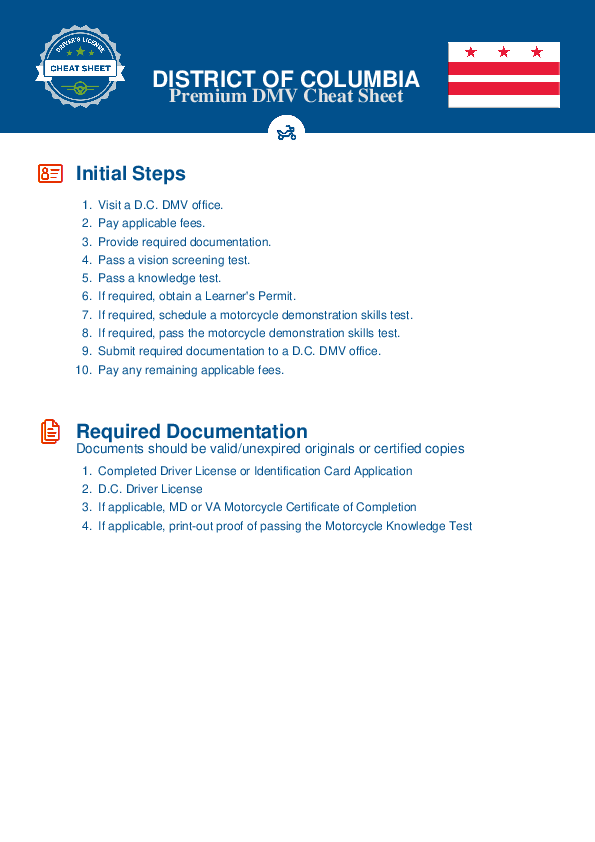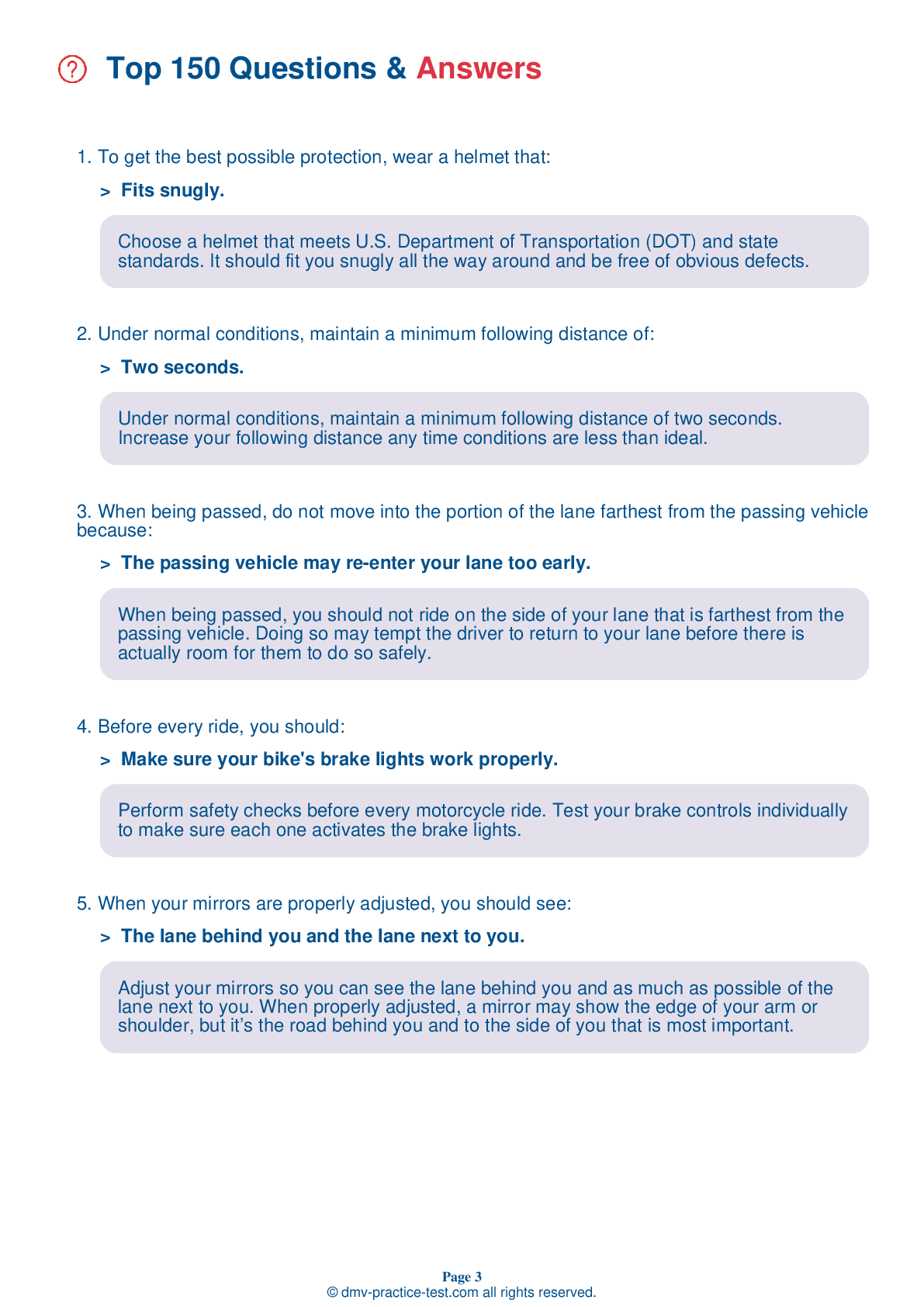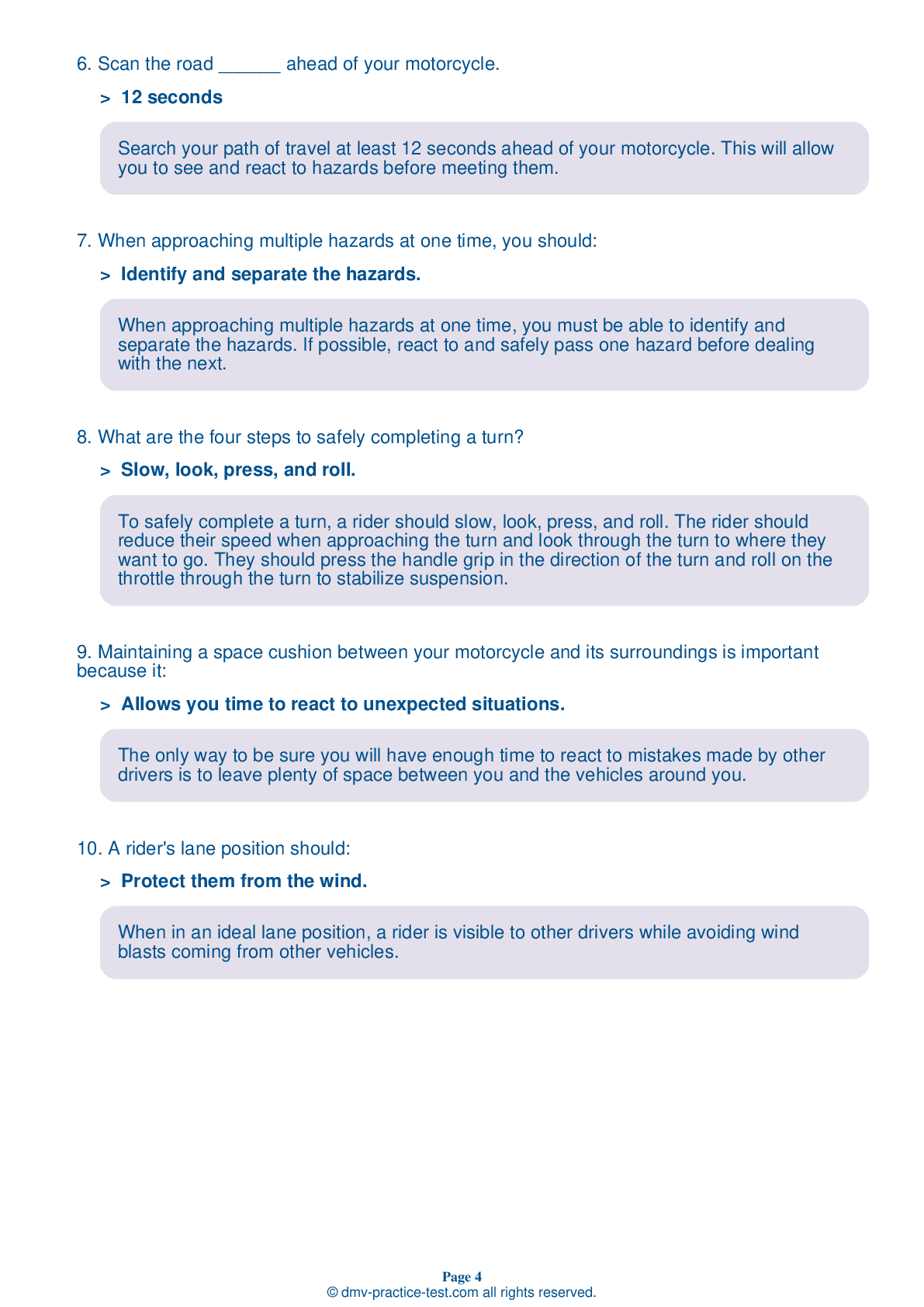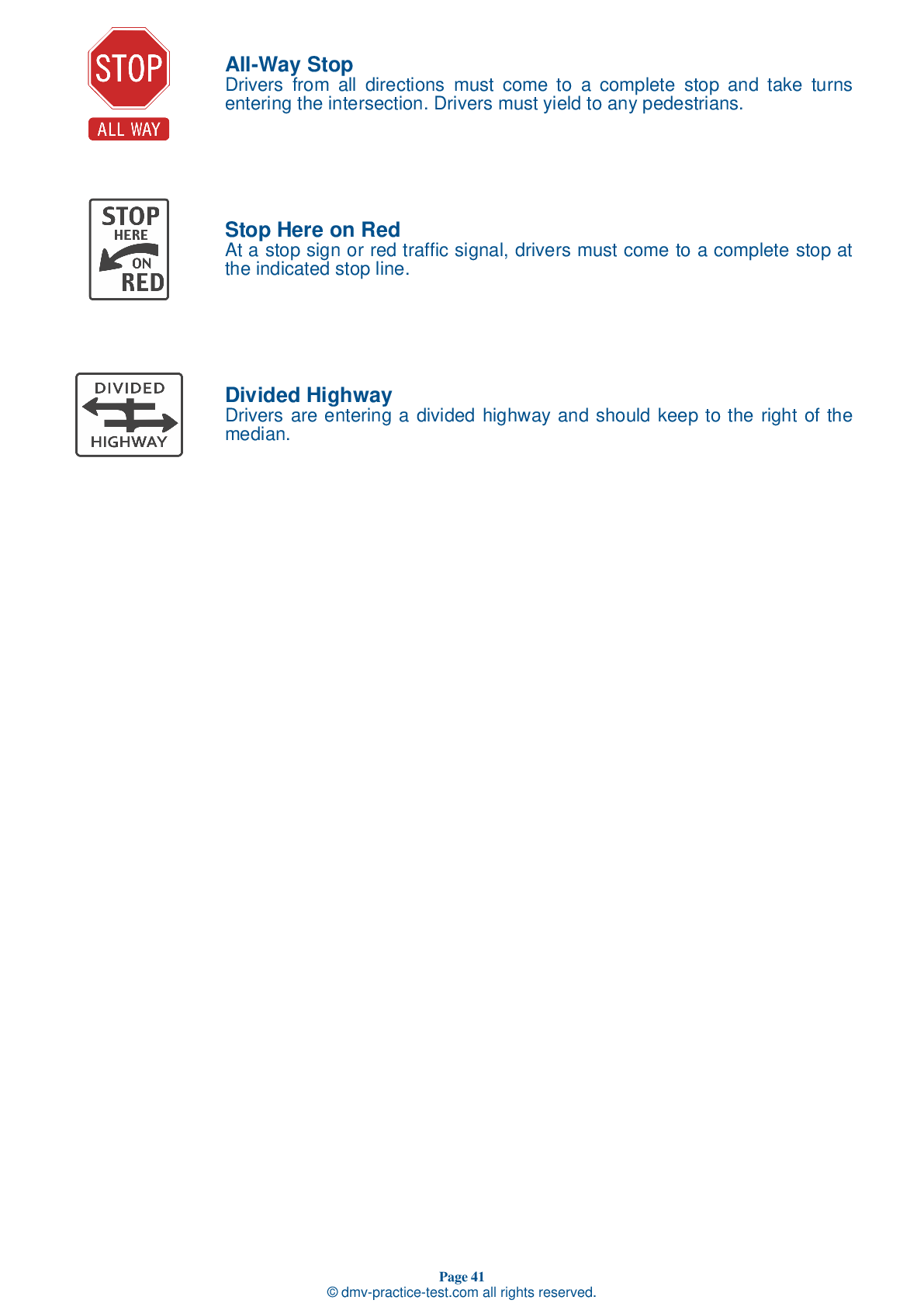DMV Permit Test #12
Motorcycle Test | License DC 2026 | FREE Online Practice! #12
Take this FREE motorcycle test (license in DC 2026) to check your knowledge of the road rules. To improve your results, download a motorcycle handbook online, study theory, and practice for free on our website. Still worried about how to get a motorcycle license in District Of Columbia in 2026? Check our website for more sample tests, train as much as possible, and boost your grades!
25
20
16
1 . Which of the following is not required equipment on a street-legal motorcycle?
A windshield
To be street-legal, a motorcycle should have at least a headlight, taillight, and brake light; front and rear brakes; turn signals; a horn; and two mirrors.
2 . To lean the motorcycle for a turn, you should:
Apply the rear brake.
A motorcycle needs to lean in order to turn. To make this happen, press on the handgrip in the direction you want to turn.
3 . Which of the following is a poor reason to sound your horn?
You are passing someone who is in the street.
It is a good idea to sound your horn before riding past a vehicle or pedestrian that may move into your lane. If you see a driver in an adjacent lane driving too closely to the vehicle ahead of them, you may assume that they want to pass and may cut in front of you to do so. If you see a person in the driver's seat of a parked car, or if you see a pedestrian or bicyclist in the street, it is a good idea to sound your horn as you pass.
4 . When being passed, all of the following are potential hazards, except:
Headlights.
When being passed, motorcyclists should be careful not to be hit by any part of the passing vehicle, including its mirrors. In addition to the vehicle itself, motorcyclists should be aware of wind gusts coming from the passing vehicle and potential objects being thrown by a passenger in the vehicle who may not be paying attention to the road.
5 . A motorcycle “fits” you if:
Your feet are unable to rest on the foot pegs.
A motorcycle fits you properly if your feet can reach the ground while you are seated on the motorcycle. It should be easy for you to reach and operate the controls.
6 . Reflective clothing should:
Be worn day and night.
Most motorcycle crashes occur in broad daylight. Increasing your visibility by wearing bright colors and reflective materials is a good idea at all times.
2026 District Of Columbia | Frequently Asked Questions
To acquire a motorcycle driver's license in the District of Columbia, you must first obtain a motorcycle permit. This requires passing a knowledge test. After practicing with the permit, you can apply for a license, which involves passing a motorcycle skills test. Alternatively, completion of an approved motorcycle training course can bypass these requirements.
In the District of Columbia, the minimum age for obtaining a motorcycle driver's license or endorsement is 18 years old. However, those who are 16 or 17 can apply if they have parental or guardian consent, have completed a motorcycle training course, and meet other licensing requirements.
Yes, you do. In the District of Columbia, you must have a motorcycle (Class M) endorsement on your driver's license to legally operate a motorcycle. To obtain this, you must pass a knowledge test, motorcycle skills test, and vision screening. Alternatively, completion of an approved motorcycle training course can waive the skills test.
To apply for a motorcycle driver's license in the District of Columbia, you'll need: a valid DC driver's license, proof of identity, proof of social security number, two proofs of DC residency, and a certificate of completion from an approved motorcycle training course if you want to waive the skills test.
Yes, you will need to take a written exam for a motorcycle license in the District of Columbia. This test covers topics such as basic motorcycle operation, safety practices, road rules, and traffic signs. It is designed to ensure that you understand the necessary knowledge to operate a motorcycle safely on the roads.
The motorcycle written test in the District of Columbia covers a range of topics including traffic laws, motorcycle operation and handling, road signs, and safe riding techniques. It also tests your knowledge on handling emergencies and mechanical problems. The questions are based on the information provided in the DC DMV Motorcycle Operator Manual.
No, in the District of Columbia, completing a motorcycle training course does not exempt you from the written test. The training course can only waive the riding skills test. You are still required to pass the written knowledge test to receive your motorcycle endorsement or permit.
To enroll in a motorcycle training course in the District of Columbia, you first need to find an approved course provider. Once you've chosen a provider, you'll need to register for the course, which typically involves paying a fee. The course will include both classroom instruction and hands-on training. Upon successful completion, you'll receive a certificate which can be used to waive the riding skills test at the DMV.
No, you do not need to own a motorcycle to take the license test in the District of Columbia. You can use any motorcycle that is registered, insured, and passes a safety inspection. If you're using someone else's motorcycle, you must have their written permission.
Yes, you can use a friend's motorcycle for the driver's license evaluation in the District of Columbia. However, the motorcycle must be legally registered, insured, and pass a vehicle safety inspection. Also, you must have written permission from the owner to use it for your test.
Yes, in District Of Columbia, specific motorcycle handling skills are tested during the driving exam. These skills include starting and stopping, turning and swerving, and quick stops. The exam also tests your ability to balance the motorcycle at slow speeds. It's crucial to demonstrate safe handling and control of the motorcycle throughout the test.
Yes, in the District of Columbia, new motorcycle drivers are issued a learner's permit before a full license. The permit has restrictions such as no passengers, no driving on highways, and only driving during daylight hours. After 30 days or completion of a motorcycle safety course, they can apply for a full license.
Yes, your District of Columbia driver's license with a motorcycle endorsement allows you to operate a motorcycle in other states. However, it's important to understand each state's specific rules and regulations concerning motorcycle operation, as they can vary. Always follow local traffic laws when traveling out of state.
Yes, in the District of Columbia, it is mandatory for all motorcycle riders and passengers to wear a helmet. The helmet must meet the U.S. Department of Transportation (DOT) Federal Motor Vehicle Safety Standard (FMVSS) 218. This law is enforced to ensure the safety of motorcycle riders and passengers.
In the District of Columbia, there are two types of motorcycle licenses: a motorcycle-only license and a motorcycle endorsement on a regular driver's license. The motorcycle-only license allows you to operate only motorcycles, while the endorsement allows you to operate both motorcycles and other vehicles, based on the class of your regular driver's license.
Yes, you can add supplementary endorsements to your motorcycle license in the District of Columbia. This allows you to operate different types of vehicles. However, each endorsement may require additional tests and fees. It's advisable to contact the District of Columbia Department of Motor Vehicles for specific details and requirements.
Yes, in the District of Columbia, the motorcycle written exam is available in multiple languages. This includes Spanish, Amharic, Chinese, French, Korean, Vietnamese, and others. However, it's advisable to confirm with the DMV about the availability of your preferred language before scheduling your exam.
One effective strategy to prepare for the motorcycle license test is to study the District of Columbia Motorcycle Operator Manual thoroughly. It covers all topics that will be on the test. Also, taking online practice tests can be very helpful as they simulate the actual exam and help you familiarize yourself with the format and type of questions asked.
Yes, in the District of Columbia, the Department of Motor Vehicles (DMV) offers the motorcycle written exam in several languages other than English. These include Spanish, French, Amharic, Chinese, Vietnamese, Korean, and more. However, it's recommended to confirm with your local DMV office about the availability of specific languages.
If you don't pass the motorcycle written test in the District of Columbia, you are allowed to retake it. However, you must wait at least three days before your next attempt. There's no limit to the number of times you can retake the test, but each attempt requires a new fee.



